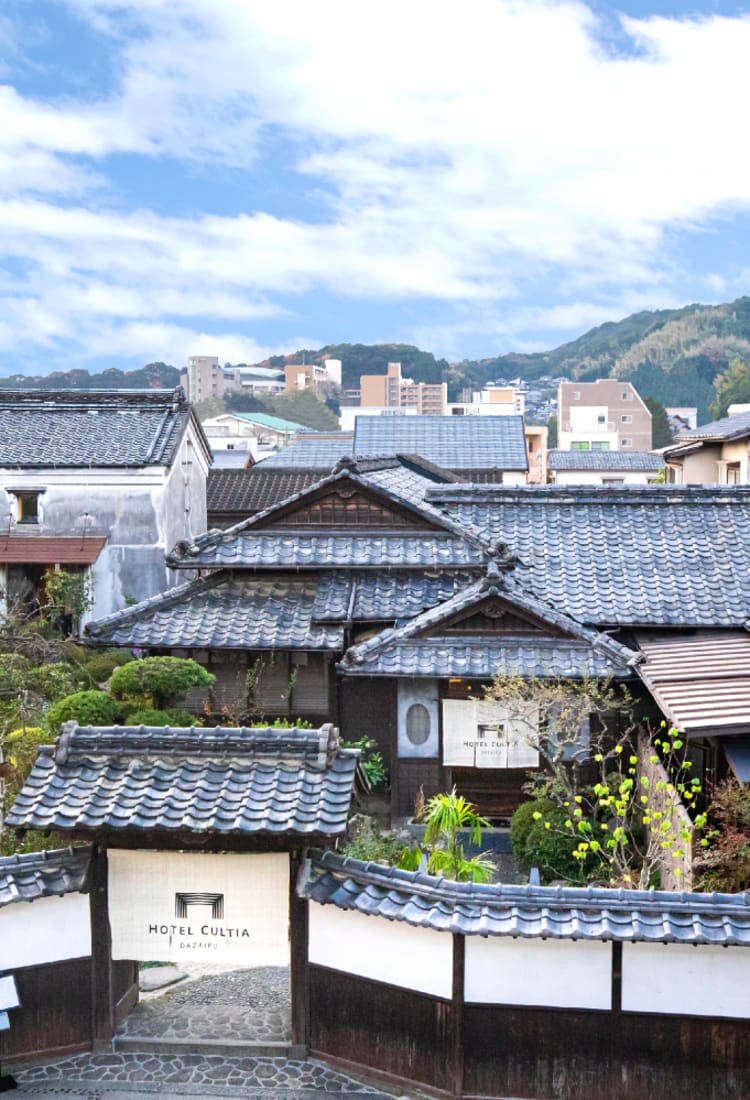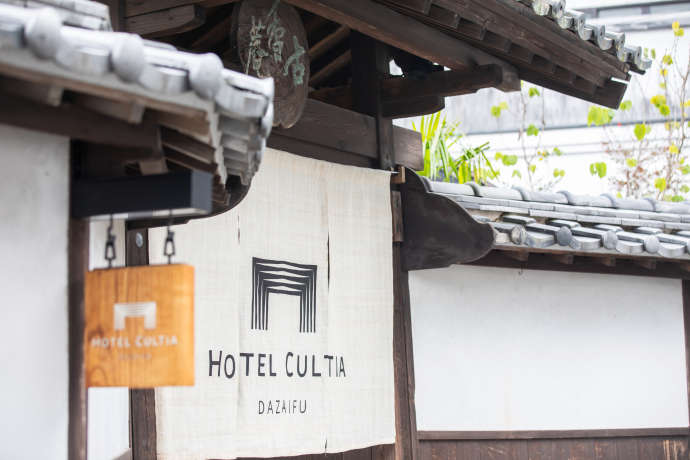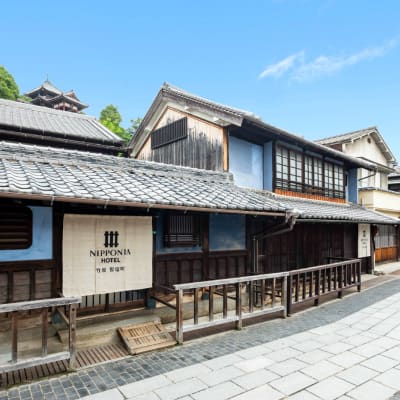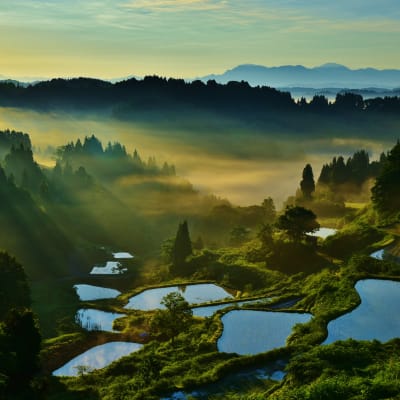
Traditional Town Stays Hotel Cultia Dazaifu Connect With the Heritage and Tradition of Dazaifu
Stay at a historical boutique property and immerse yourself in the fascinating history and rich cultural heritage of Japan’s ancient western capital
Discover Dazaifu through Hotel Cultia Dazaifu’s boutique heritage properties. Feel at home in one of several inviting, lovingly restored properties, from former artists' residences to businesses that once served members of Japan’s Imperial Court. The hotel’s buildings retain the atmosphere and aesthetic of the time in which they were built, with stylish modern furnishings and superb amenities.

Hotel Cultia Dazaifu’s traditional facade
The hotel provides the perfect base for exploring Dazaifu’s many cultural and historical attractions, quaint shopping streets, varied cuisine, and wealth of art.
Between the late seventh and twelfth centuries, the Imperial Court governed western Japan from Dazaifu and sent and received envoys to kingdoms in Asia. The city was a center of cultural exchange and diplomacy. Traces of this rich heritage can be uncovered at sites throughout Dazaifu and through exclusive experiences arranged by the hotel.
Deeply connected to Dazaifu
Hotel Cultia Dazaifu is a collection of restored buildings and private residences, within a short walk of one another, in the heart of Dazaifu. These renovated accommodations date from the Meiji (1868–1912) and Taisho (1912–26) eras and include a former fishmonger’s shop and a kaiseki restaurant. This layout lends itself to exploration and discovery, integrating the town, its heritage, and the hotel.

A beautifully refurbished room with traditional touches
Staying at Hotel Cultia Dazaifu, guests can enjoy the charming, traditional atmosphere of the properties while having the attractions of Dazaifu right at their doorstep. Each of the hotel's properties has been carefully restored, preserving the original structure—earthen walls, pillars, ceiling panels, and woodwork—and furnished with modern comforts. All guest rooms are equipped with the highest quality linens and made-in-Japan amenities. Some rooms have bathrooms furnished with handcrafted hinoki cypress bathtubs.
The hotel’s concierge is deeply knowledgeable about the town, providing local intel that elevates a stay into a rich learning experience through exclusive programs and tours. Through these experiences, guests can connect with the culture and traditions of Dazaifu in a lasting and meaningful way.

The lush courtyard garden of a restored residence
Hotel Cultia Dazaifu is part of an ongoing community development initiative to restore and preserve Dazaifu's most important properties—many of which had fallen into disuse—and breathe new life into the area. Dazaifu is buzzing by day, but a very quiet place at night, and the hotel has established itself as a primary force for drawing more overnight guests to the city. The hotel continues to add new properties to its collection while working closely with the community.
French-style cuisine made with the finest local ingredients
Take a seat at Le Un, the hotel’s chic restaurant, where antique wooden furniture and floor-to-ceiling windows allow comfortable views of the traditional courtyard garden to take center stage. This air of simple sophistication is carried into the cuisine, with regionally sourced, seasonal Japanese ingredients, prepared with French flair. Enjoy dishes featuring fresh fish from the waters off the coast of northern Kyushu, local meats, and seasonal produce from across Kyushu.

Exquisitely prepared, locally sourced cuisine at Le Un
©Fukuoka Prefecture Tourist Association
The hotel can accommodate most special dietary requirements with advance notice.
Dazaifu Tenmangu—a sanctuary for learning, culture, and the arts
Dazaifu Tenmangu is a prestigious Shinto shrine with a 1120-year history. The shrine complex is set in beautiful grounds, a short walk from the hotel. Dazaifu Tenmangu venerates the deity of learning, culture, and the arts, and its precincts house beautifully crafted statues and contemporary artworks. At the center of Dazaifu Tenmangu is the striking honden, the spiritual heart of the shrine complex. The beautiful structure is adorned in rich colors and with delicate carvings.

Dazaifu Tenmangu's expansive grounds are well suited for exploring.
The shrine maintains a prestigious art program, inviting artists from around the globe to create and exhibit their works within the grounds. On display amid the leafy precincts and ancient shrine buildings are thought-provoking works by acclaimed international artists including Ryan Gander, and Simon Fujiwara. Pick up an art map and stroll the grounds keeping an eye out for the works, some of which blend almost seamlessly into the landscape.

Striking contemporary artworks are on display throughout Dazaifu Tenmangu's precincts.
©︎Ryan Gander Really shiny stuff that doesn’t mean anything, 2011 Courtesy of Taro Nasu, Tokyo
The shrine venerates Sugawara Michizane (845–903), a legendary figure who made invaluable contributions to Japanese society and culture, and the main sanctuary is built where he was buried. Sugawara Michizane is worshipped at Dazaifu Tenmangu and Tenjin shrines throughout the country as Tenjin, the deity of learning, culture, and the arts.
Nighttime worship at Dazaifu Tenmangu
As dusk falls, the shrine empties of visitors, and the grounds, bustling by day, take on the quiet beauty of night. The shrine is at its most serene and compelling after dark, bathed in the light of the moon and the warm glow of a few isolated lights. Hotel Cultia Dazaifu can make special arrangements for guests to experience Dazaifu Tenmangu after dark.

Dazaifu Tenmangu’s honden, the main sanctuary, at night
The experience begins at an entrance to the shrine reserved for priests and special worshippers. A priest in ceremonial attire will greet you, and then escort you to the ornate two-story romon gate, the entrance to the shrine’s most sacred space. Upon arriving at the gate, the imposing double doors swing gently open, revealing the inner sanctum. In the stillness of night, the priest leads you quietly through the courtyard and up onto the raised platform of the honden (main sanctuary), where the ceremony commences with a purification ritual. Once the ritual is complete, the priest offers a prayer to the venerated deity, Tenjin. As you watch the ceremony unfold in a display of graceful movements, to the rustle of paper and the gentle jingle of bells, take the time for quiet contemplation. At the end of the ceremony, you will be invited to offer a prayer of your own.
Kyushu National Museum—Dazaifu as a gateway between Japan and Asia
Kyushu National Museum is one of the five national museums of Japan. Its exhibits explain the development of Japanese culture against the backdrop of Asian history. They cover Japanese prehistory through the late 1800s, with an emphasis on Dazaifu and its heritage as an ancient gateway between Japan and Asia.

The Kyushu National Museum’s steel and glass exterior reflects the natural surroundings.
Guests at Hotel Cultia Dazaifu can get exclusive access to the museum with an after-hours tour. Tours are typically conducted on Saturday evenings and can be arranged through the hotel concierge.
Relax and refresh the senses
From the ancient camphor trees in the grounds of Dazaifu Tenmangu to the lush green hills that encircle the town, Dazaifu and its environs are imbued with natural beauty. Hike Mt. Homan for sweeping views of the Kyushu countryside. The trail begins at Kamado Shrine, a secluded Shinto sanctuary hidden among trees, almost undetectable except for the weathered stone torii gate that marks the entrance to the grounds.
Thermal waters fill the baths of Harazuru Onsen, a rustic hot-spring resort with a range of options from cozy, indoor baths for private bathing to shared open-air baths set in scenic grounds. The waters, mostly alkaline, are renowned for their beautifying and skin-smoothing properties.

A relaxing open-air bath in Harazuru Onsen
Kawachi-Fujien botanical garden, about an hour’s drive from Dazaifu, in Kitakyushu, features extensively in international coverage of Japan for its dramatic tunnel of wisteria that bloom in a spectrum of purple hues in late spring. The garden is equally striking in late autumn, when hundreds of Japanese maple trees turn vibrant shades of red.

Kawachi-Fujien’s marvelous wisteria tunnel
Measures against the spread of COVID-19
The hotel has implemented measures to ensure the health and safety of its guests and staff: All areas throughout the hotel are regularly disinfected and ventilated, alcohol disinfectants are made available in common areas, tables in the dining area are spaced apart, and breakfast can be served in your room.
Please note that certain programs and events may have been canceled or temporarily suspended due to COVID-19. Please check the hotel website or inquire in advance.



























































